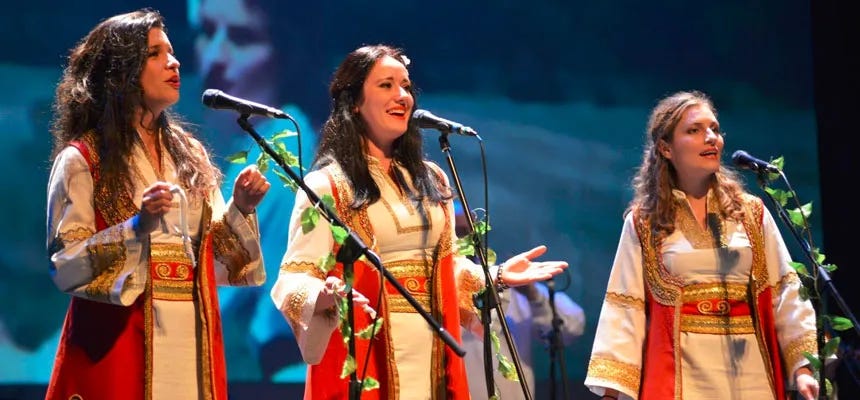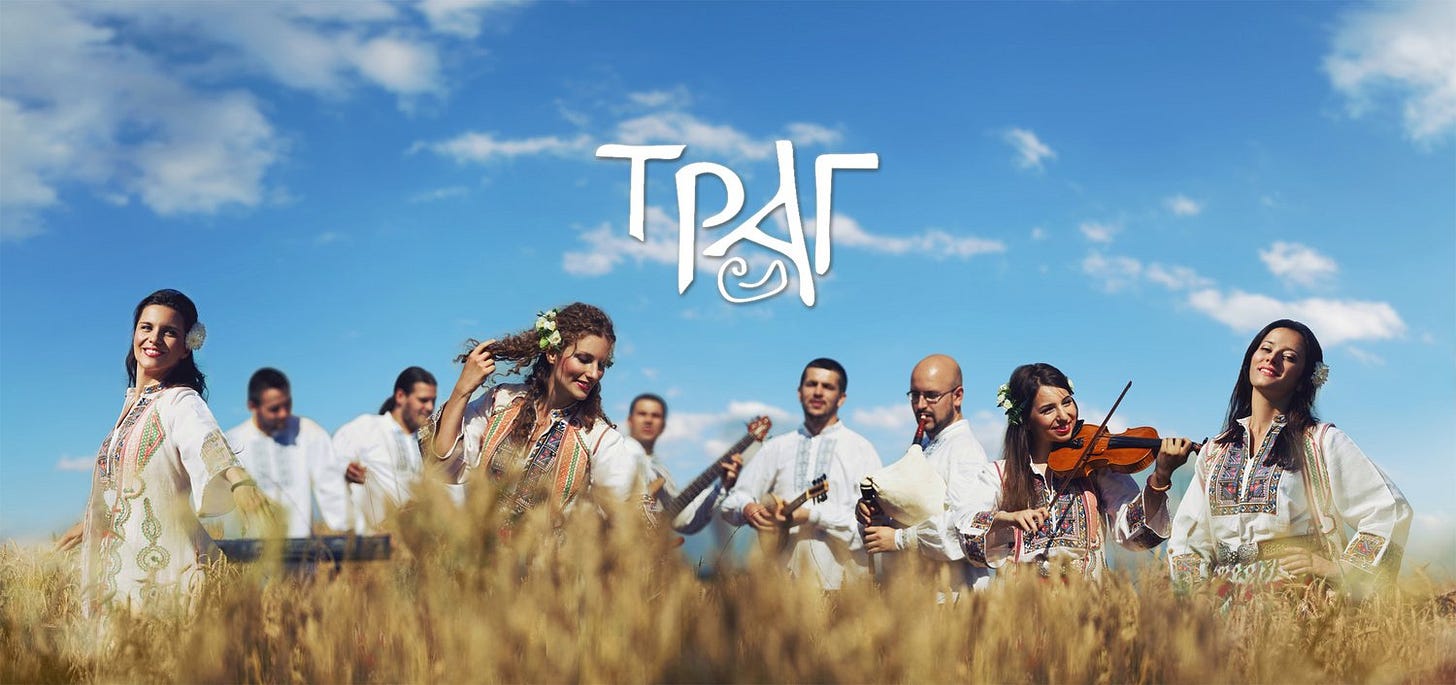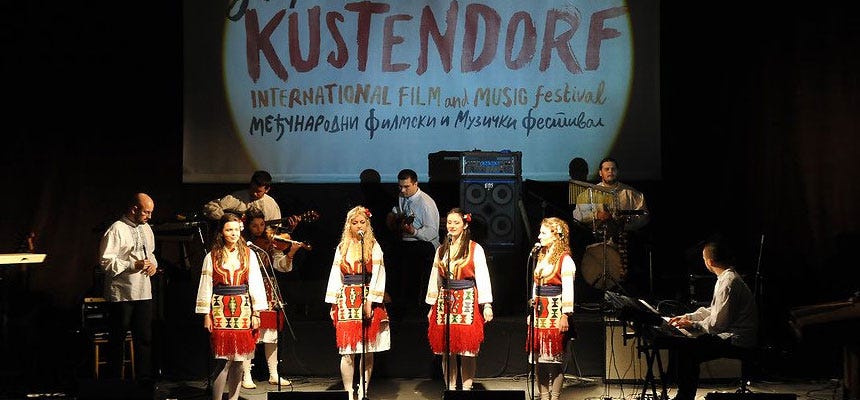“Who is that girl?”
Čio e ono Devojče
If you didn't already know, I am David, a 71-year-old British expat living in Bosnia and Herzegovina and someone who has lived in Bosnia and Herzegovina for the past 22 years.
This podcast blends engaging conversations with locals and narrative-driven episodes that take you on immersive journeys through the region’s history, food, and everyday life
This is the last post for 2024 from me.
I thought I would end, or rather “wrap up” with something simple, but that I think is very powerful.
We have an amazing ethno group called “Trag” based in the town of Laktaši, that’s only a few kilometres away from where we live.
I just found a video of a song they have arranged, and I wanted to share it with you, so as to give you a flavour of the rich traditional musical culture that surrounds me.
This song, “Čio e ono Devojče?” is originally from Eastern Serbia.
Who are “Trag”?
Ethno Group Trag is a renowned vocal and instrumental ensemble from Bosnia and Herzegovina dedicated to preserving and promoting traditional Balkan music. They are known for their unique interpretations of folk songs, bringing a fresh perspective to centuries-old musical traditions while staying true to the cultural roots of the region.
Founded in 2003, Ethno Group Trag was established as part of the Cultural-Artistic Association “Slavko Madić” in Laktaši, near Banja Luka.
The group features ten members, including four female singers specialising in traditional vocal harmonies and six instrumentalists who use both traditional and modern instruments, such as tambura, accordion, violin, flute, and percussion.
The word “Trag” translates to “trail” or “trace,” symbolising their mission to trace and preserve the cultural heritage of the Balkans.
Trag’s Musical Style and Repertoire
Their repertoire includes authentic songs from:
• Republic of Srpska
• Bosnia and Herzegovina
• Serbia
• Montenegro
• North Macedonia
• Bulgaria
They blend traditional instruments with modern arrangements, creating a harmonious fusion that appeals to contemporary audiences while preserving the original essence of the songs.
Not subscribed yet? Join Coffee and Rakija for authentic stories, and unique perspectives on life in Bosnia and Herzegovina, straight from someone who’s been living here for over 25 years!
If you would rather just give some occasional support maybe you could buy me a coffee?
The Unique Sound of Eastern Serbia
Eastern Serbia boasts a rich and vibrant musical tradition that captures the essence of the region’s cultural heritage. Its songs and melodies, deeply rooted in the daily lives, myths, and folklore of the people, offer a glimpse into a world where music is more than entertainment. It really is a way of life.
One iconic song that echoes beyond the borders of Eastern Serbia is “Jovano, Jovanke.” Known and loved across the entire Balkans, this traditional tune exemplifies the heartfelt themes of love, longing, and the rhythms of rural life that characterise the region’s music.
What makes the music of Eastern Serbia so unique?
Well to be honest it’s the fusion of traditional instruments, vocal techniques, and storytelling:
• Raw Vocals and Izvike:
Traditional singing often features izvike, a powerful and emotive vocal expression. Women, especially, would sing in groups, creating rich polyphonic harmonies without instrumental accompaniment.
• Instruments of Heritage:
Bagpipes (gajde), wooden flutes (frula), and the shepherd’s kaval, provide a hauntingly beautiful backdrop to many songs, adding to their ethereal quality.
• Themes of Everyday Life:
Whether celebrating love, recounting stories of mythical heroes, or reflecting on the struggles of rural life, the songs carry a deep connection to the people’s history and soul.
A Living Tradition
Even today, these traditional songs are performed at cultural festivals, village gatherings, and special events, keeping the spirit of Eastern Serbia alive. Listening to them is not just about enjoying music, it’s about connecting to a timeless way of life that continues to inspire.
So, whether you’re drawn to the haunting melodies of the bagpipes or the intricate harmonies of folk singing, the music of Eastern Serbia invites you to explore its unique charm.
‘Tis the end of another year.
I’ll be back posting here in January, after Serbian Orthodox Christmas. 2024 wasn’t the best year I ever experienced, but as my neighbours say here “Šta je tu je” (it is what it is).
I’ll leave you with some “ethno fusion” of Serbian traditional and classic rock (in a way). Listen for those haunting bagpipes and the wonderful vocals from the girls voices. ⬇️
Your feedback means the world to me. I genuinely enjoy reading and responding to your comments, as it keeps the conversation alive. If you found this post valuable, hitting the 🧡 or sharing it helps it reach more readers. Thank you for your support!
Come and Visit Us in Bosnia and Herzegovina
📈 The Survey 📊
I have a short survey designed to improve my Substack. It would be super helpful if you could find under 5 minutes to complete it. Thanks so much in advance.
And Finally
Don’t forget that you can read back editions of the Digital Magazine, listen to previous podcasts (we have quite an archive now), or catch other content, all this is available on the web interface, just like a regular blog.
Tamara and I appreciate your faithful support, your comments, and your generosity!
Until next time.
THANKS SO MUCH ❤️
If you can’t subscribe to Coffee and Rakija, for whatever reason, and really would like access to all my content, please drop me a message.










Super cool sound! Almost sounds Scottish, Irish and African combined with the bag pipe and fiddle and tambourine. Looks like a deer skin bagpipe